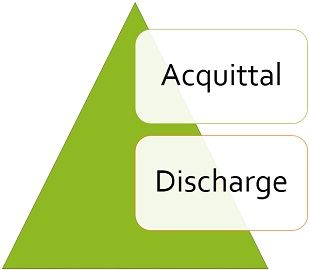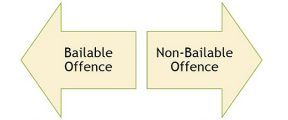 Criminal Procedure Code, 1973 is concerned with criminal law, in India. It permits the Court to acquit or discharge the person arrested, in relation to the alleged offence. There is a wide misunderstanding among folks that acquittal and discharge are synonyms, but that’s not true. While Acquittal is a verdict by the Judge, that the accused is not guilty of the offence which is charged on him.
Criminal Procedure Code, 1973 is concerned with criminal law, in India. It permits the Court to acquit or discharge the person arrested, in relation to the alleged offence. There is a wide misunderstanding among folks that acquittal and discharge are synonyms, but that’s not true. While Acquittal is a verdict by the Judge, that the accused is not guilty of the offence which is charged on him.
On the contrary, discharge means the act of releasing a person from custody, due to insufficient grounds, to further proceed with the case.
What is a Trial?
A legal examination of the facts and evidence by the Judicial Magistrate or Judge, so as to make a decision regarding the guilt or innocence, as to civil or criminal case. The trial starts after framing the charge and it concludes with conviction or acquittal of the accused.
Also Read: Difference Between Hearing and Trial
This post is to enlighten you with all the laws and rules relating to the concept and difference between acquittal and discharge.
Content: Acquittal Vs Discharge
Comparison Chart
| Basis for Comparison | Acquittal | Discharge |
|---|---|---|
| Meaning | Acquittal means legally freeing the accused, when he is found innocent by the court, after considering all the facts and evidence submitted in this regard. | Discharge means a legal order of release given by the magistrate when the grounds on which he/she is arrested came out as false or unsubstantiated. |
| What is it? | Verdict in a criminal case, of not guilty of the offence. | Order in a criminal case, of not sufficient grounds for legal proceedings |
| Rearrest | An acquitted person cannot be rearrested on the same grounds. | A person who is discharged can be rearrested on the same grounds. |
| Results from the absence of | Complainant or withdrawal or compounding of offence. | Any evidence against the accused. |
| Charges | A person can be discharged before framing charges. | A person can be acquitted only after the framing of charges. |
| Innocence | Acquittal is ordered when the innocence of the accused is proven after a full inquiry in a judicial process. | Discharge is given because of the non-availability of any prima facie evidence against the accused. |
| Second Trial | Restrains the second trial | Fresh proceedings can be initiated |
Definition of Acquittal
Acquittal is the verdict given by the judge, that legally confirms the innocence of the accused. Hence, it is given when the court finds that the accused has not committed the crime, charged on him. It implies that the prosecutor remained unsuccessful to prove in the court that the case is beyond a reasonable doubt.
Now, you must be wondering what does reasonable doubt means?
Basically, reasonable doubt is a standard of proof, of a supreme level, which needed to be provided to obtain a guilty verdict.
When Acquittal is given?
- The decision is given when after examination of the evidence and arguments regarding the case provided by the prosecution and defence, the Judge is of the view that the accused is innocent, as there is no strong evidence that supports the commission of the offence by the accused, Acquittal is given.
- Hence, there is no such evidence submitted to the court that confirms the commitment of the crime by the accused only.
- If, on the evaluation of the evidence received against the accused, provided by the prosecution, the judge believes that there is no solid proof which indicates that the accused has committed the offence, the judge orders Acquittal of the accused as per section 232 of the Criminal Procedure Code.
- Nevertheless, when the offender is not acquitted by the court under section 232, he/she will be allowed to give defence and evidence. And after considering the arguments of the two sides, the court may acquit the accused under section 233 of CrPC.
Also Read: Difference Between Detention and Arrest
Definition of Discharge
According to Section 227 of the Criminal Procedure Code, on considering the record of the case and documents submitted in relation to the case, and after hearing both the parties, the Judge believes that there are not enough grounds for further proceedings against the accused, the accused shall be discharged.
So, the accused can be discharged when sufficient evidence is not present against him. The court has to state why the accused has been discharged from the case.
Elements of Discharge
The court must take into account the charge sheet and documents presented, by the Police. The essential elements of Discharge are:
- The Magistrate may examine the Accused if required.
- Equal opportunity is given to both parties of being heard.
- Charges imposed on the accused are baseless and false, in the view of the magistrate.
When the aforementioned conditions are met, the accused shall be discharged
Cases when Session Judge is obligated to Discharge the accused
- Cases in which the evidence provided are not enough.
- Cases in which there is the absence of any legal ground against the person who has been charged with the offence.
- Cases in which permission has not been obtained.
- Cases in which prosecution is barred by limitation, i.e. the suit is taken to the Court, after the expiration of the stipulated term by which the proceedings should have been started in the court of law, will be limited.
- Cases in which the accused has been prevented from proceedings due to a foregoing judgement of the High Court.
Also Read: Difference Between Judge and Magistrate
Key Differences Between Acquittal and Discharge
So far we have discussed, the meaning and sections relating to the two terms, let us now understand the difference between acquittal and discharge:
- After hearing the two sides, and verifying all the evidence, if the judge is of the view that there is not enough evidence against the accused, on the basis of which the case may proceed further, in such a case, he/she gives the order for discharge and records the reasons for such order. On the contrary, an order for acquittal is given by the court, when it reaches the conclusion that there is no strong evidence against the accused that can prove the commission of the offence by him.
- Acquittal is a verdict in the criminal case that the accused is not guilty of the offence. On the other hand, discharge is an order given by the Magistrate that there are not enough grounds to lead the proceedings further against the accused.
- According to the principles of autrefois and double jeopardy, the accused is prevented from being tried again on the same charges after the acquittal in the same jurisdiction. But, the one who is discharged from the case can be rearrested on the same grounds for further questioning.
- While acquittal can be given when there is the absence of complainant or withdrawal or compounding of offence. As against discharge can be given when there is the absence of sufficient evidence against the accused.
- Discharge of the accused takes place, prior to the framing of charges. On the other hand, acquittal takes place after the charges are framed against the accused.
- It must be noted that an order for acquittal is made after the inquiry and trial regarding the case is complete. Hence, it is a judicial decision, which is declared after the accused is proven innocent in the Court of law. Conversely, discharge of a person is made when no evidence could be found to validate further inquiry against the accused. So, it does not prove the innocence of the accused.
- In case of discharge, fresh proceedings can be started if strong and material evidence is found. In contrast, acquittal restrains the second trial regarding the same offence or a different offence, considering the same facts.
Determination of Sufficient Ground
Discharge of the accused takes place when there is ‘No sufficient grounds to proceed with the case. Here, no sufficient ground means that a reasonable person cannot arrive at a conclusion that there exists any base or reason to continue the alleged charge against the accused concerning the offence.
When the Session Judge is of the view that the trial is going to be ineffective or a waste of time, he is bound to discharge the accused.
Conclusion
Acquittal procedure plays a crucial role in Criminal law, to make certain that an innocent is not punished for an offence, which is not committed by him. However, the victim can make an appeal to the court, if he/she believes that the accused has been acquitted, wrongly.






Leave a Reply